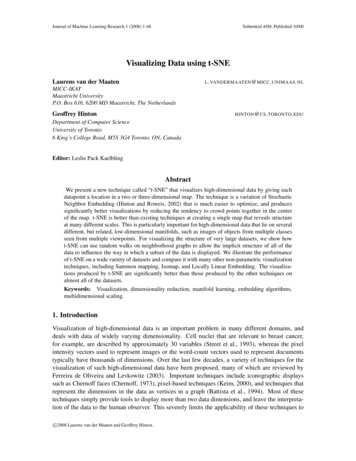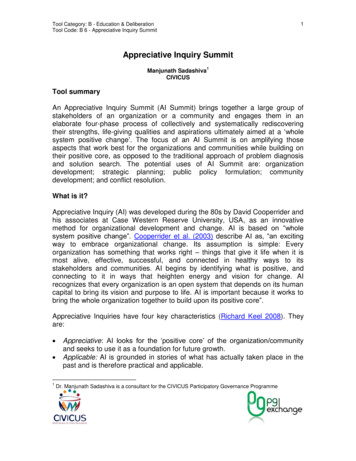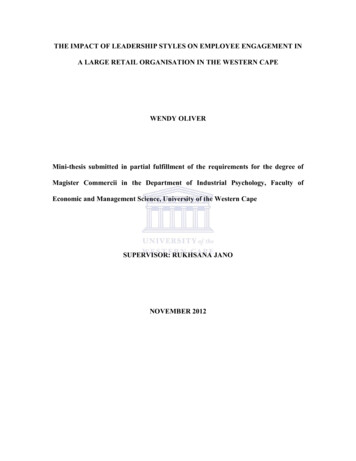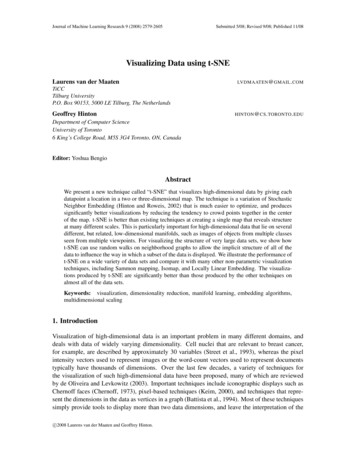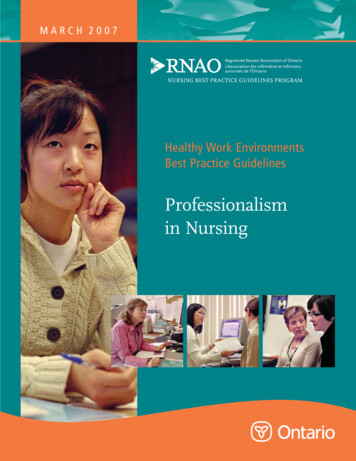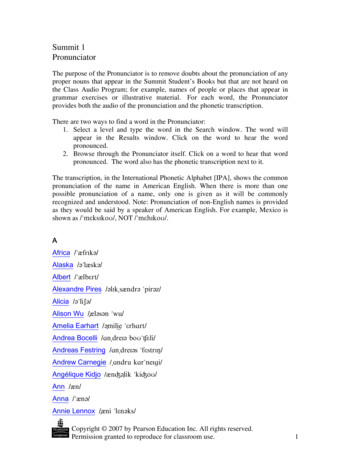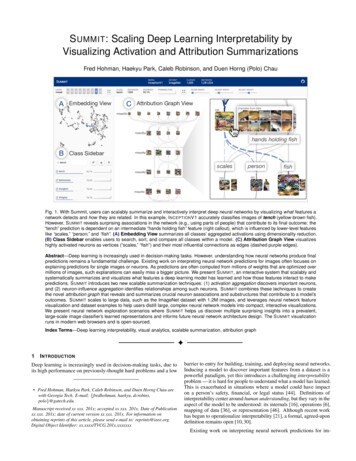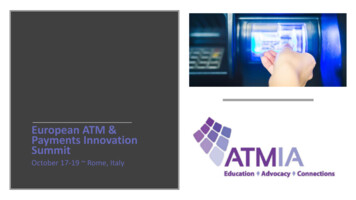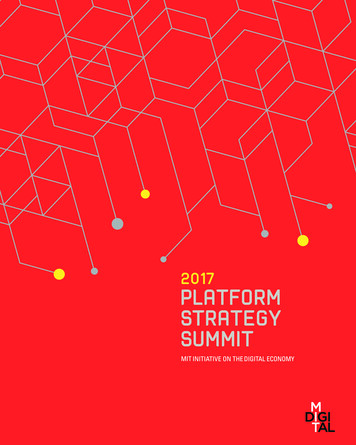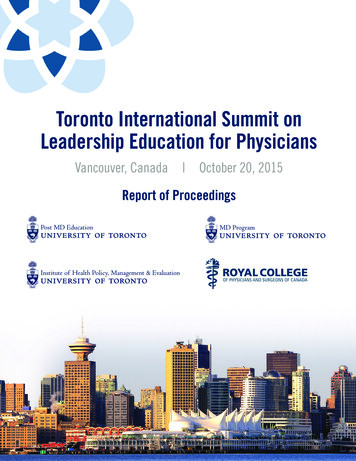
Transcription
Toronto International Summit onLeadership Education for PhysiciansVancouver, Canada October 20, 2015Report of Proceedings
TORONTO INTERNATIONAL SUMMIT ON LEADERSHIP EDUCATION FOR PHYSICIANS VANCOUVER, CANADA OCTOBER 20, 2015PROCEEDINGS: TISLEP 2015The second annual Toronto International Summit on LeadershipEducation for Physicians (TISLEP 2015) was held in Vancouver,BC, Canada on October 20, 2015. TISLEP 2015 representeda key milestone in the process of harnessing an internationalgroup of thought leaders, educators, patients, learners, facultyand other stakeholders to develop a competency based physicianleadership curriculum for post-graduate trainees. Hosted by theUniversity of Toronto and the Royal College of Physicians andSurgeons of Canada, and run as an open pre-ICRE (InternationalConference on Residency Education) event, the Summit broughttogether 80 individuals from 10 countries to further the dialogueon the requisite leadership and management competenciesneeded by physicians to ensure quality health care for allpatients. This meeting functioned in part as a status report forthe work underway in this regard.The theme for this year’s Summit was ‘Transforming the healthcare system through Physician Leadership’. The morning plenarywas delivered by Dr. Douglas Cochrane, paediatric neurosurgeonand Chair of the British Columbia (BC) Patient Safety & QualityCouncil, who discussed ‘The Impact of Physician Engagementand Leadership’. He shared a narrative around his leadershipjourney: under his leadership, the Council has made majorstrides in improving the quality of care and patient safety acrossthe province through a broad healthcare redesign programme.What an inspiring example of physician leadership and healthsystem transformation!The core agenda for the Summit was designed to build on theyear’s work by working groups established after TISLEP 2014.Thirty-two individuals from around the globe committed to workon a international generic leadership curriculum that could be2adapted in accordance with local contexts, resources and needs.These 32 individuals were divided into five working groups andtasked with establishing physician leadership teaching andassessment strategies and resources, and an accompanyingstrategy for programme evaluation. The goal was to presentpreliminary results at TISLEP 2015. There were two workingassumptions for the groups: 1) the major role of a leader isto influence others toward a common vision 2) whereas a fewphysicians will become healthcare system leaders (requiringenriched leadership competencies), all are leaders within theirlocal microsystems and as such all require core knowledgeand skills (essential competencies) in order to exercise theirleadership in the care of their patients.A challenge that had been encountered early on in the workof the working groups was the lack of a uniform language andframework for building the physician leadership curriculum.As a proof of principle that 5 multi-national groups could domeaningful and synergistic work at a distance, it was decided
TISLEP REPORT OF PROCEEDINGSthat all groups would tackle an early core competency ofemotional intelligence (EI), dividing the work into those activitiesthat are strictly knowledge driven (learner centric) and those thatoccur at the interface of direct patient care (learner/ patientcentric). As a result, in order to ensure that all TISLEP 2015attendees had a common understanding of the deliberationsthat led to the terminology selected and the specific outputs ofthe working groups, 2 brief snapshots addressed the rationalefor starting with EI and the scope of leadership milestones. Thefirst, ‘Where does physician leadership education start? Emotionalintelligence and a case for self’, was delivered by Dr. JamiuBusari from Maastricht University, who introduced attendees toGoleman’s five components of Emotional Intelligence that wereadopted for exploration by the working groups. Thereafter, Dr.Deepak Dath from McMaster University discussed ‘Milestones:Does one size fit all?’, paving the way for further discussion aboutthe requisite competencies at various stages of training.With this context provided through these snapshots, WGChairs of 4 groups then presented a synopsis of their group’swork. The programme evaluation group provided a programmeevaluation template for consideration along with some orientatingcomments. The afternoon was spent obtaining feedback andconsultation on the WG’s past year’s work. Participants joined theWG Chairs to discuss teaching and assessment of leadership inphysicians and were able to join a second group at the halfwaypoint if they wished.By multiple measures, the day was considered a success,including increased attendance over the previous year withmore international representation, and an array of outreach andpartnership opportunities with others working on leadershipcurricula. Additional recruitment to working groups was highlysuccessful as well. Work continues on developing the first phaseof the international competency-based leadership curriculumthat will be launched September 27th at TISLEP 2016 inNiagara Falls, Canada.Dr Penny Bellam, a hematologist by training and previousDeputy Health Minister of the Province of British Columbia andCity Manager for Vancouver led the closing plenary, ‘Leveragingpolicy to lead system transformation’. Through personal andother anecdotes, Dr Bellam shared challenges encountered inmaking system level change and underscored the importance ofphysician leadership in making this happen.3
TORONTO INTERNATIONAL SUMMIT ON LEADERSHIP EDUCATION FOR PHYSICIANS VANCOUVER, CANADA OCTOBER 20, 2015Toronto InternationalSummit on LeadershipEducation for PhysiciansTransforming the health care system through Physician Leadership - ProgrammeTuesday, October 20, 2015The Vancouver Club – 915 West Hastings Street, Vancouver, BCWelcomesJason Frank, MD, Director, Specialty Education, Royal College of Physicians and SurgeonsSalvatore Spadafora, MD, Vice Dean, PostMD, University of TorontoRoger Wong, MD, Associate Dean, PGME, University of British ColumbiaOpening RemarksIntroductions and Objectives for the SummitAdalsteinn Brown, PhD, Director, Institute for Health Policy, Management and Evaluation, University of TorontoOpening PlenaryThe Impact of Physician Engagement and Leadership in Quality Improvement and Patient SafetyDoug Cochrane, MD, Professor, Division of Paediatric Neurosurgery, UBC, Patient Safety and Quality Officer, Province ofBritish ColumbiaSnapshot 1: Physician leadership educationWhere does physician leadership education start? Emotional intelligence and a case for selfJamiu Busari, MD, Associate Professor, Maastricht UniversitySnapshot 2: Physician leadership educationMilestones: Does one size fit all?Deepak Dath, MD, Professor, McMaster UniversityCURRICULUM DEVELOPMENT FOR PHYSICIAN LEADERSHIPFacilitated by Fiona Moss, MD, Dean, Royal Society of MedicineEssential Leader Milestones1 Learner centredPresented by: Deepak Dath,MD & Lindy Samson, MD2 Learner and PatientcentredPresented by: Fedde Scheele,MD & Fran Kirby, MEdEnriched Leader Milestones3 Learner centredPresented by: DianeMeschino, MD & MelchorSanchez Mendiola, MD4 Learner and PatientcentredPresented by: Jamiu Busari,MD & Mark Wilson, MDCURRICULUM DEVELOPMENT FOR PHYSICIAN LEADERSHIP: BREAK-OUT SESSIONSEssential Leader Milestones1 Learner centredFacilitated by: Deepak Dath,MD & Lindy Samson, MD2 Learner and PatientcentredFacilitated by: Fedde Scheele,MD & Fran Kirby, MEdEnriched Leader Milestones3 Learner centredFacilitated by: DianeMeschino, MD & MelchorSanchez Mendiola, MDReport back and DiscussionFacilitated by Adalsteinn Brown, PhD and Fiona Moss, MD5-minute report back from each group followed by group discussion and wrap-upClosing PlenaryLeveraging policy to lead system transformationPenny Ballem, MDSynthesis of Summit Key Themes, Next Steps and FeedbackFiona Moss, MDAdjournment44 Learner and PatientcentredFacilitated by: Jamiu Busari,MD & Mark Wilson, MD
TISLEP REPORT OF PROCEEDINGSTISLEP CO-CHAIRSAdalsteinn Brown PhD, Director, Institute of Health, Policy,Management & Evaluation, University of Toronto, andFiona Moss MD, Dean, The Royal Society of Medicine, UnitedKingdomPLANNING COMMITTEEDr. Anne Matlow Committee Co-ChairFaculty Lead, Strategic InitiativesPostgraduate Medical Education, University of TorontoLEARNING OBJECTIVESTISLEP was accredited by both the RCPSC and the College ofFamily Physicians of Canada (CFPC) with the following presetlearning objectives:Dr. Ming-Ka Chan Committee Co-ChairClinician Educator & Associate Professor, Royal College ofPhysicians & Surgeons of Canada, Department of Pediatrics& Child Health, University of ManitobaDr. Adalsteinn Brown Director, Institute of Health Policy,Management & Evaluation, University of TorontoAt the end of the Summit, participants will be able to:Dr. Fiona Moss Dean, Royal Society of Medicine, UnitedKingdom Discuss the importance of physician leadership in healthsystems transformation,Dr. Deepak Dath Professor & CanMEDS Clinician EducatorRoyal College of Physicians & Surgeons of Canada Discuss two strategies physicians can initiate to promotesystems level change, and Distinguish between essential and enriched leadershipcompetencies.Dr. Gerald Da Roza Clinical Assistant Professor, University ofBritish ColumbiaDr. Jamui Busari Associate Professor, Maastricht UniversityDr. Jordan Bohnen Resident, Massachusetts General HospitalLisa Bevacqua Event & Project Planner, Postgraduate MedicalEducation, University of Toronto5
TORONTO INTERNATIONAL SUMMIT ON LEADERSHIP EDUCATION FOR PHYSICIANSCountries Represented at TISLEP dsNew ZealandSwedenUnited KingdomUSA6 VANCOUVER, CANADA OCTOBER 20, 2015
Sponsorship provided by:Keep in touch:tislep.pgme.utoronto.ca@TISLEP MD
What an inspiring example of physician leadership and health system transformation! The core agenda for the Summit was designed to build on the year’s work by working groups established after TISLEP 2014. Thirty-two individuals from around the globe committed to work on a
